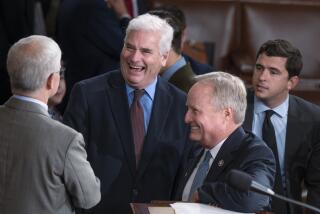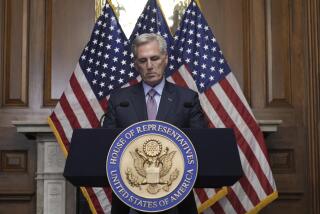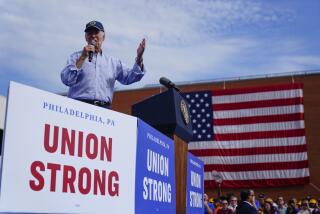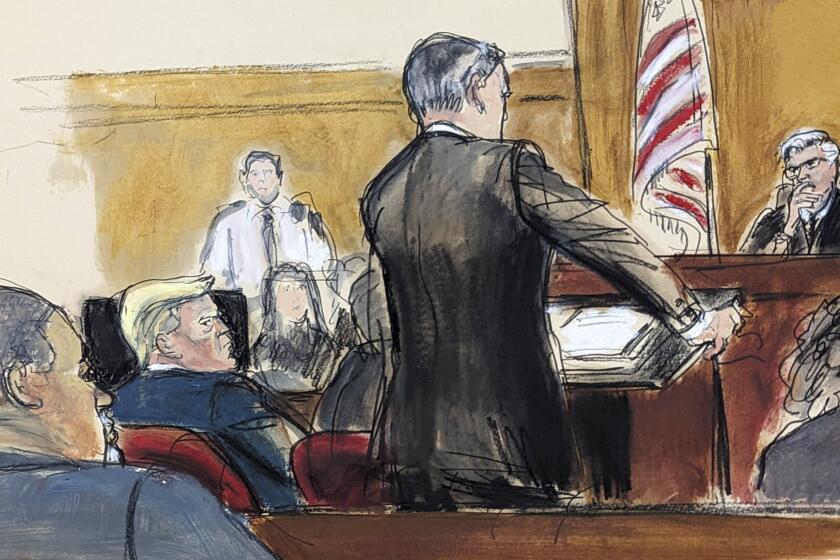Obama, Boehner clash over timing of president’s jobs speech
In a back-and-forth that raised familiar doubts about whether Democrats and Republicans can work together when Congress reconvenes next week, President Obama and House Speaker John A. Boehner tangled anew Wednesday. But the issue wasn’t budgets or debt. It was a date.
Obama asked to schedule a rare joint session of Congress for a prime-time address about jobs the Wednesday after Labor Day. In a rare, if not unprecedented, rebuff in modern times, Boehner (R-Ohio) rejected the president’s request and recommended the following night.
A speech next Wednesday, in which Obama wanted to unveil his plan to improve the U.S. jobs picture, would have upstaged a televised debate among Republican presidential candidates at the same time, which the White House said was a coincidence.
By Wednesday night, the president gave in.
“We consulted with the speaker about that date before the letter was released, but he determined Thursday would work better,” White House Press Secretary Jay Carney said in a statement. “The president is focused on the urgent need to create jobs and grow our economy, so he welcomes the opportunity to address a joint session of Congress on Thursday, Sept. 8, and challenge our nation’s leaders to start focusing 100% of their attention on doing whatever they can to help the American people.”
The original timing of the president’s speech request was seen by Republicans as political big footing, and a sign that the partisan tension hasn’t dissipated much, if at all, over their summer vacation.
The situation struck some Capitol veterans as almost unprecedented in modern times.
Congress often convenes jointly for various ceremonial events and meetings, but formal joint sessions are rare. Outside of the annual State of the Union address, aides said, only few joint sessions have been convened in recent years, including when President George W. Bush addressed Congress after the terrorist attacks of Sept. 11, 2001, and when Obama spoke on healthcare in September 2009.
Usually these types of arrangements are worked out privately ahead of time, congressional aides said, and the speaker and Senate majority leader extend an invitation for the president to address Congress.
“It is unprecedented to reject the date that a president wants to address a joint session of the Congress,” said a senior Democratic aide familiar with arranging such events in the Capitol. “Yes, consultation always occurs, but the president always gets the date he wants.”
“Can’t think of a precedent offhand, but it is predictable,” said Julian Zelizer, a professor at Princeton University who has written extensively on American politics. “The GOP has a consistent strategy: block, obstruct and make life difficult for the president. Whatever he wants, as Groucho Marx said, they are against it.”
Obama is considering a range of options for his jobs plan, which is likely to include some form of infrastructure spending to repair roads, bridges and school buildings, as well as tax breaks for businesses that hire new workers. Obama may also propose extension of the payroll tax cuts and unemployment benefits passed in bipartisan measures in December.
In addition, the administration is considering some way to help struggling homeowners, perhaps with a program that lets more people take advantage of low interest rates by refinancing their mortgages.
The president requested the session via letter Wednesday as he went on the offensive against Republicans on another jobs issue. Obama demanded before TV cameras in the Rose Garden that members of Congress support key transportation bills on which he said more than 1 million jobs depend.
Republicans mocked the president’s call for passage of the highway bill and accused Obama of jumping on a nonissue for political reasons. The chairman of the House Transportation Committee indicated willingness to go along with a temporary extension to the end of the year, roughly what the White House is hoping for.
“Aside from the president today, no one has suggested the highway bill will be allowed to expire,” said Brendan Buck, a spokesman for Boehner.
Still, any fight involving spending is expected to draw fire from conservatives in both chambers, and Republicans did not rule out the possibility of attaching policy measures or making other cuts to the highway bill.
Such moves probably would prompt opposition from Democrats and further stall the bill. Republicans resisted Obama’s core economic proposals over the course of the summer as the two sides worked to steer the federal government away from a credit default. Now administration officials enter the fall budget talks with a wary sense that, on the brink of a presidential election year, Republicans won’t yield on much of anything.
Earlier in the day, Carney said that the country witnessed a lot of harmful posturing and gamesmanship this summer and that the White House learned a few lessons from the experience and did not want a repeat.
“We can’t have that,” Carney said. “We can’t afford it.”
Moving the date of the speech hasn’t resolved all conflicts, however. The speech will now conflict with the opening night of the National Football League season.
Kathleen Hennessey in the Washington bureau contributed to this report.
More to Read
Start your day right
Sign up for Essential California for news, features and recommendations from the L.A. Times and beyond in your inbox six days a week.
You may occasionally receive promotional content from the Los Angeles Times.








